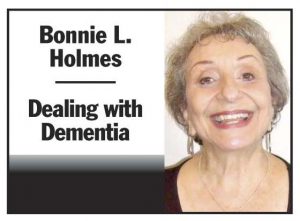If my mama has Alzheimer’s, will I?
 A year after my sister-in-law died from advanced stages of Alzheimer’s disease, her 55-year-old daughter, Debbie, came to me asking, “Will I also have this disease? I seem to easily forget things I should remember, such as a person’s name, or where I left my keys.”
A year after my sister-in-law died from advanced stages of Alzheimer’s disease, her 55-year-old daughter, Debbie, came to me asking, “Will I also have this disease? I seem to easily forget things I should remember, such as a person’s name, or where I left my keys.”
This is a common fear. Alzheimer’s disease researcher Robyn Honea of the University of Kansas said, “It is estimated that people who have relatives, especially mothers, with Alzheimer’s disease are four to 10 times more likely to develop the disease themselves compared to people with no family history.” However, this is not a verdict.
There are two forms of Alzheimer’s — early onset and late onset. Early onset is rare. Symptoms start before the age of 65. This type of Alzheimer’s tends to cluster within families. Often, several generations are affected. In many cases this form of Alzheimer’s is caused by mutation in one of three genes. People with these extremely rare mutations tend to develop Alzheimer’s disease in their 30s or 40s. On average, half of the children of a person with one of these rare genetic mutations will inherit the disease. Those who do not inherit the mutation cannot pass it on and are not susceptible to getting Alzheimer’s. It is also important to know that these mutations are extremely rare and account for fewer than one in 1,000 cases of Alzheimer’s.
The second form, late onset Alzheimer’s disease, is much more common than early onset Alzheimer’s. It effects people older than 65. Research is constantly being done for this group. It has been found that in the regular aging process all of us lose brain vitality (gray matter), and there is brain shrinkage. Those with parents (especially mothers) with Alzheimer’s experience this at a faster rate than those without parents who have this disease.
What can you do if you have this concern? First, share your apprehension with your doctor. A complete assessment can be made. It would include family history, a physical exam, a neurological exam, mental clarity tests and brain imaging. Second, research reveals that aside from DNA, environment, lifestyle and eating habits also play a large role. Those who exercise regularly, stimulate mental acuity and eat a healthy diet can possibly delay, if not circumvent Alzheimer’s disease.
So many people have asked if they can ask me questions or tell me concerns regarding dementia. The answer is yes. Please address them to me at askbonnie@outlook.com. While you remain anonymous, answers to your questions will be revealed in the newspaper so that you and others can benefit. I look forward to hearing from you.
Bonnie Holmes is president of Loving Health Care Inc. Although the well-qualified caregivers care for clients with many different types of needs, the specialty of the company is clients with dementia. For more information, call (864) 916-9204.



























